In September 2010, when Claire O’Brien (’11) was studying Middle East & South Asia Studies as a junior at Wake Forest, a 36-year-old Scottish aid worker named Linda Norgrove was kidnapped in Afghanistan and died a month later during a rescue attempt.
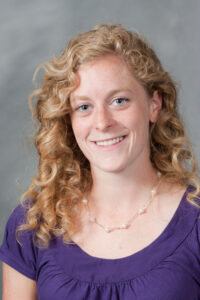
At top: 19 Afghan medical students with John and Lorna Norgrove on arrival in Edinburgh. Photo courtesy of The Linda Norgrove Foundation Above: Claire O’Brien (’11) as a Presidential Aide in 2010. Photo by Ken Bennett
This fall, on Oct. 5, O’Brien and her sisters, Rose O’Brien (’18) and Anne O’Brien, corralled about 30 friends to participate in a “Run for Freedom,” raising money and awareness for the work of The Linda Norgrove Foundation, a tiny nonprofit started by Norgrove’s parents, John and Lorna Norgrove, to continue their daughter’s work. The foundation recently helped 19 women medical students leave Afghanistan to continue an education in Scotland that the Taliban had denied them at home. Since then, the tiny charity’s sole employee has been helping them through the huge transition from isolation in their own homes with their families for three years to the wide-open freedom women enjoy in the West. The Taliban have institutionalized restrictive gender norms, banning women from education and most professions — and barring them from public spaces.
The O’Brien sisters share a lifelong commitment to humanitarian work. They moved to Winston-Salem as children when their parents, both doctors and medical school professors, took jobs at what is now Atrium Health Wake Forest Baptist Medical Center. Claire O’Brien, a partner at Brooks, Pierce, McLendon, Humphrey & Leonard, LLP, a Greensboro, North Carolina, law firm, sits on the boards of Partners Ending Homelessness and Greensboro Beautiful. Rose O’Brien, a financial sanctions policy adviser for the U.S. Department of the Treasury in Washington, founded the Student Association For the Advancement of Refugees while at Wake Forest, through which about 40 students helped local refugees with tutoring, rides and other support. And Anne O’Brien, who works in the City of Chicago’s Office of Inspector General, coordinated fundraising and an events fair as an undergraduate for the Yale (University) Hunger and Homelessness Action Project.
Now, the sisters are exploring additional ways to elevate the current plight of Afghan women and provide more support. Kelly Greene (’91), managing editor of Wake Forest Magazine, recently caught up with Claire O’Brien to discuss their efforts. Here are excerpts from the conversation, edited for brevity and clarity.
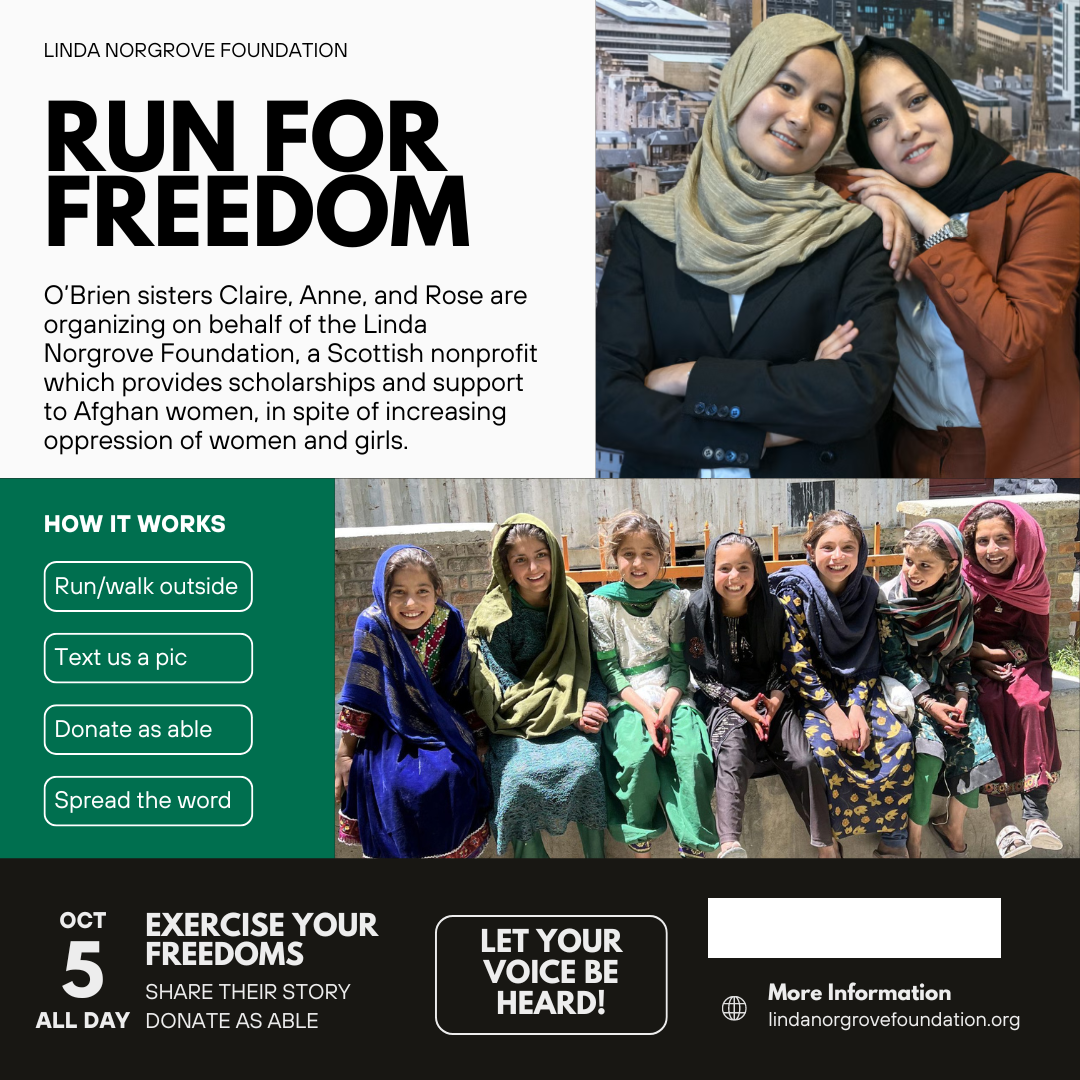
Kelly Greene: How did you wind up organizing a race to benefit Afghan women studying medicine in Scotland?
Claire O’Brien: We have a sister text chain, and we were seeing articles in the news about what was happening in Afghanistan to women, basically after the U.S. withdrew, and were increasingly upset to hear about the restrictions on them. We had this sense of, “What could anybody possibly do to help?” Anne sent an article about the Linda Norgrove Foundation, and how they had organized efforts to bring 19 Afghan medical students to Scotland so they could complete their education, because they weren’t going to be allowed to complete their education in Afghanistan. This was an enormous effort by them. It required them to advocate for legislative change in Scotland’s government so that the women could come over on a visa, and then organize their journey and then pay for the school.
I thought, “That is someone doing something really concrete and specific to help. … Why don’t I reach out to them and see if there’s anything we can do to help the foundation, with these medical students and their work with girls in Afghanistan?” So, I emailed them. And they responded and said, “One thing you could do is, we have this annual 10K (run) fundraiser. There’s no expectation that you would come all the way to Scotland to participate, but maybe you could organize something remotely to raise awareness and to raise money for the foundation.” And so that’s what we did in October.
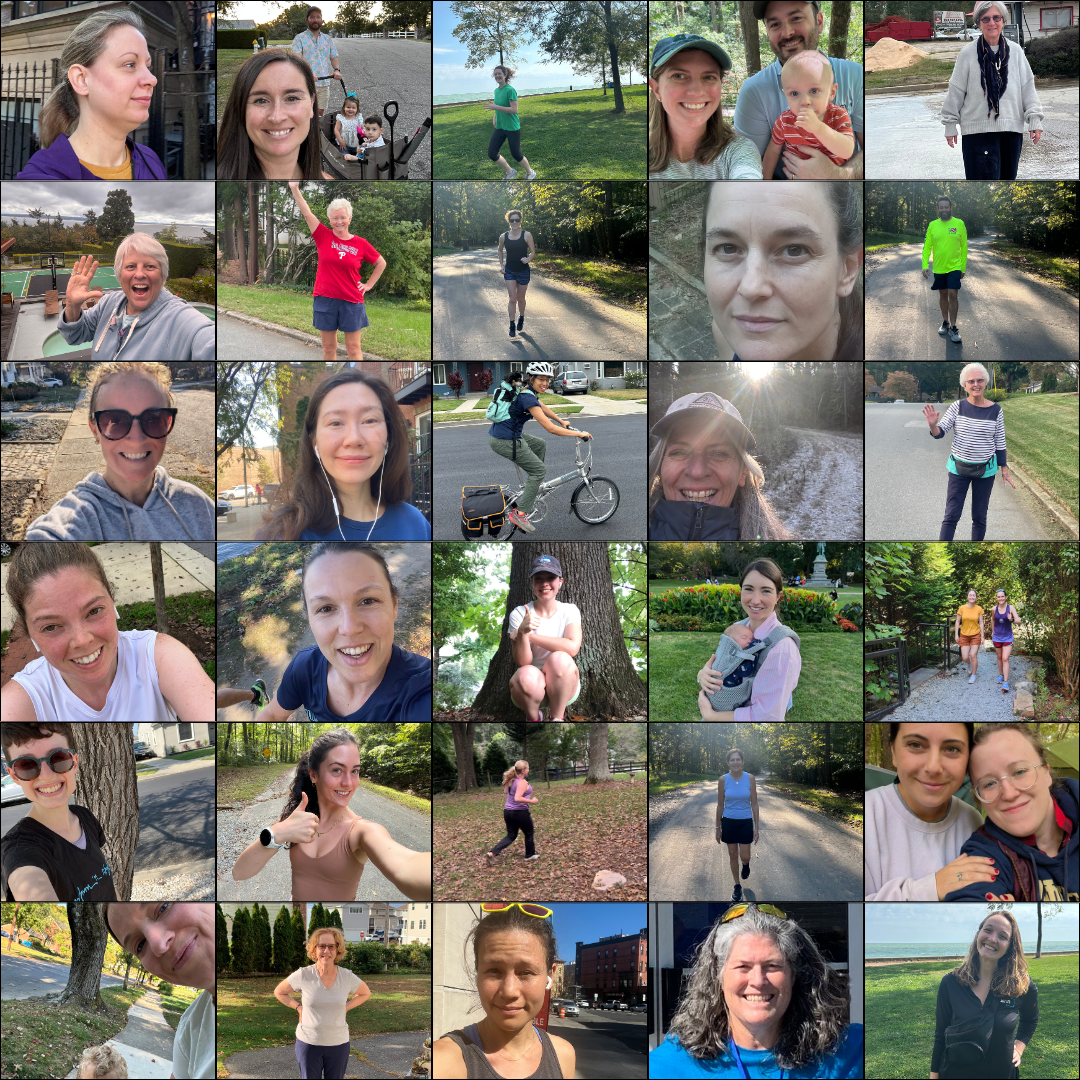
Participants in the Run for Freedom organized by the O'Brien sisters in October. Image courtesy of Claire O'Brien
We reached out to our friends and family to see if they would participate. And the idea was that you don’t have to come to one place, but just on the day, go outside, run or walk as far as you can. So maybe you can’t do a 10K, but you have the right to be able to go outside and exercise, and you can raise your voice and speak in public and be part of a specific dialogue in a way that’s being denied those women there. So, think about that, and then, if you wish, also donate to the foundation. (The run raised £915, according to the foundation, which is the equivalent of about $$1,150.)
KG: It sounds like you had a good contingent of Wake Forest friends involved?
CO: Yes! My friends Cate Berenato Sullivan (’11, JD ’17), Hope Nardini Malloy (’11) and her husband, John Malloy (’11), and Lauren Dayton (’11). And our friend Elizabeth Wallace. She’s like Anne — she didn’t go to Wake Forest, but we grew up with her, and it just seems like she did. (Her mother, Marybeth Sutton Wallace (’86), coordinates the Wake Forest Fellows program.)
The idea was just to acknowledge the humanity of these women and to say, “We see what’s happening to you. We don’t think it’s OK, and we want to help in whatever way we can. And we may not be able to solve this problem, but we can try to do something, and that’s better than doing nothing.”
Afterward, we put together a grid with photos of all the participants, and we sent that out to everyone so they could see the others who had joined in the effort. And then Anne and Rose and I, primarily Anne, drafted a template letter that people could tailor to send to their (U.S.) senators and representatives. Maybe 50% of the participants asked for it. I don’t know how many followed through and sent it, but Anne, Rose and I did. So hopefully, that will (make women in Afghanistan) top of mind for our various representatives.
"Imagine if your daughter wanted you to go to the park, and you had to say, 'We can’t go. I’m not allowed.' It just makes my heart hurt."
We’re encouraging our government and other governments not to recognize the Taliban or to engage with them diplomatically until they roll back these restrictions, to say, “This is a red line for us. And if you’re going to have this dual system where women and girls are completely excluded from society, then we’re not going to deal with you until you fix it.” The United Nations met with the Taliban, and they accepted the Taliban’s condition that (Afghan) women be excluded from the talks, which many women activists found counterproductive.
KG: Will there be another run?
CO: We could do the run again next year, and maybe do it even bigger. This time, when I emailed (the foundation), there were only two or three weeks to organize it. But next year, maybe we try to do it here, and have people come. Maybe we try to go to Scotland and do it there.
But most importantly, between now and the run next year, I think it would be nice if we could look back and see that these are the additional things that we’ve done to keep helping, and not have it just be an annual thing, but have it be a continuing effort until there’s some meaningful change in the lives of those women and girls.
They need education, healthcare and change on the government level. Rose found a grant we can apply for through the Citizen Diplomacy Action Fund to continue this work. We’re thinking about how else we can help and just keep chipping away at the problem and not just let it be a headline you read where you say, “Oh, that’s too bad,” and move on with your day.
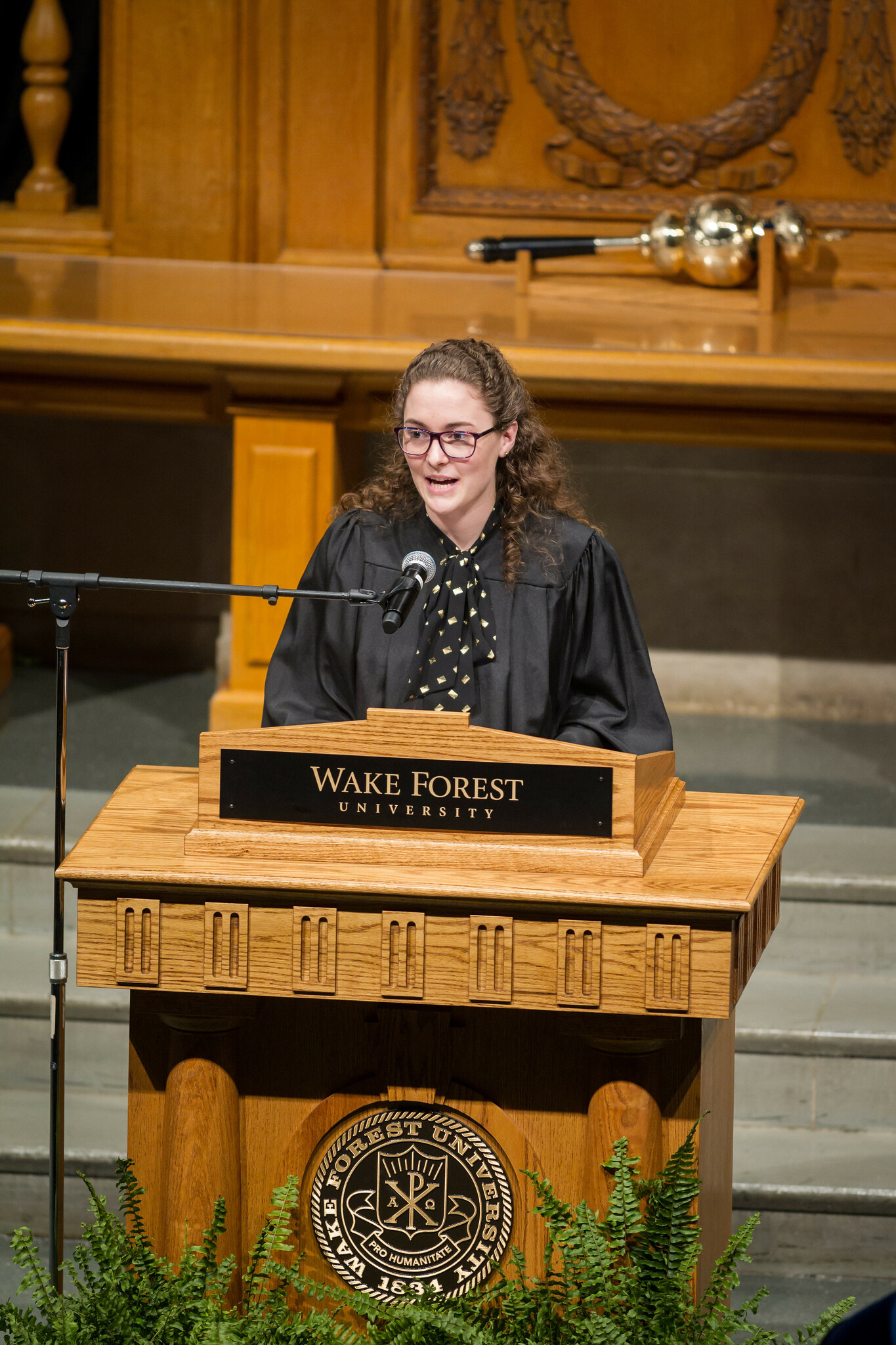
Rose O'Brien ('18) giving her oration at the Founder's Day Convocation in Wait Chapel in February 2018. Photo by Mitchell Loll ('19)
KG: What are the 19 Afghan medical students now in Scotland expected to do after they graduate?
CO: It’s my understanding that they’re at different universities in Scotland. PBS did a recent article about them. The idea is that they’ll complete their medical education, and then they’ll do what they want to do. If they want to go back to Afghanistan and try to be doctors there, if that’s even possible, then they can. But I don’t think there’s any requirement that they do that. It’s just giving them the opportunity to forge a path.
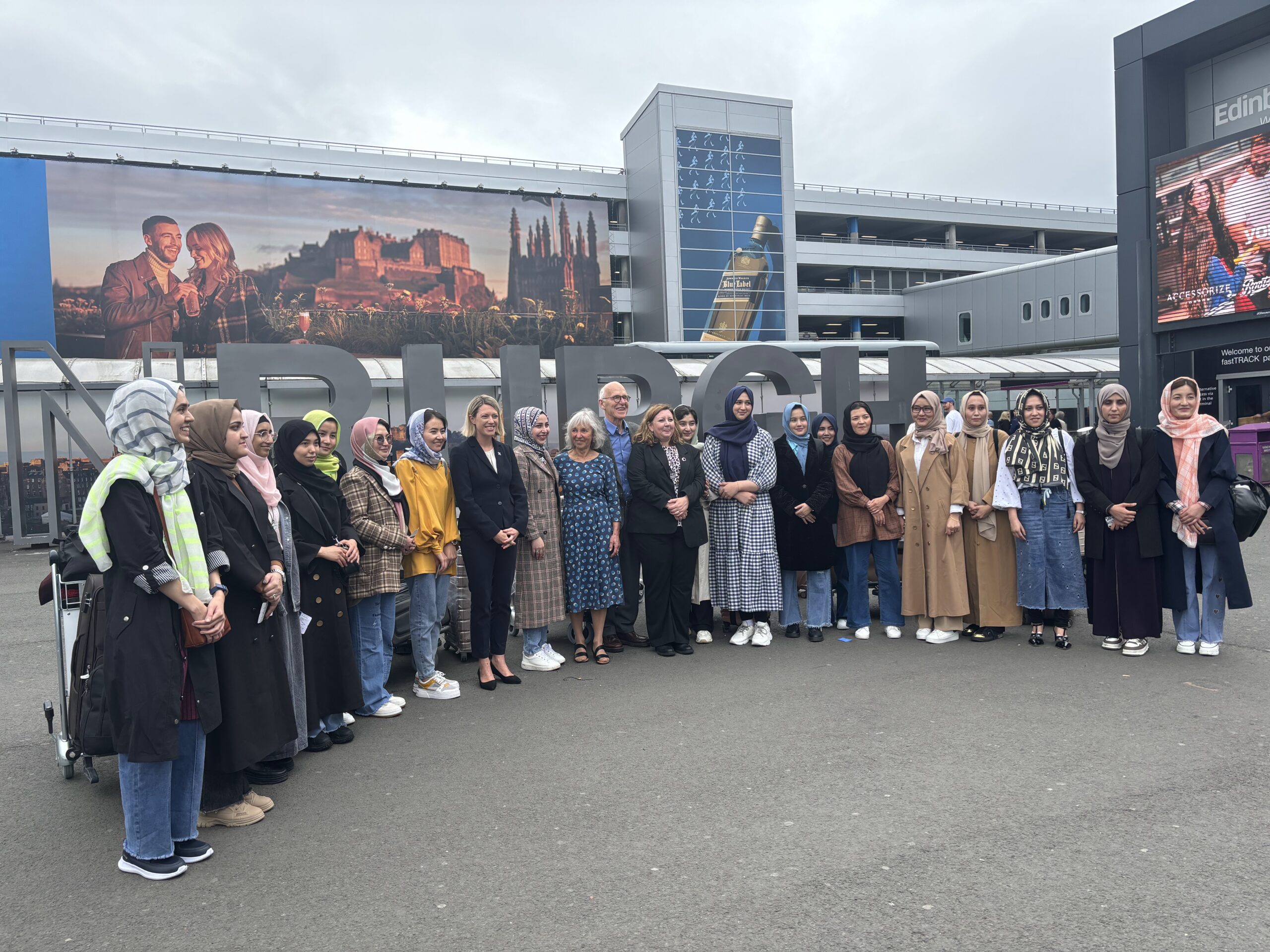
The Afghan students upon their arrival in Scotland with representatives from The Linda Norgrove Foundation. Photo courtesy of The Linda Norgrove Foundation
KG: Going back to your time at Wake Forest, you minored in Middle East & South Asia Studies, right? What drew you to studying that part of the world?
CO: I just had an interest in it. I studied Arabic, and I enjoyed it. I’m not sure I was very good at it, but I thought it was interesting and fascinating, and I have always had an interest in human rights, but also especially equal rights for women. It’s something I was always thinking about back then and continuing today.
And thinking about Afghanistan, why spend so much time and effort depressing the rights of half of the population? As a mother to a daughter (O’Brien has a 3-year-old), thinking especially about the impact on girls, one of the things we read was women aren’t allowed to go to public parks anymore. Imagine if your daughter wanted you to go to the park, and you had to say, “We can’t go. I’m not allowed.” It just makes my heart hurt.
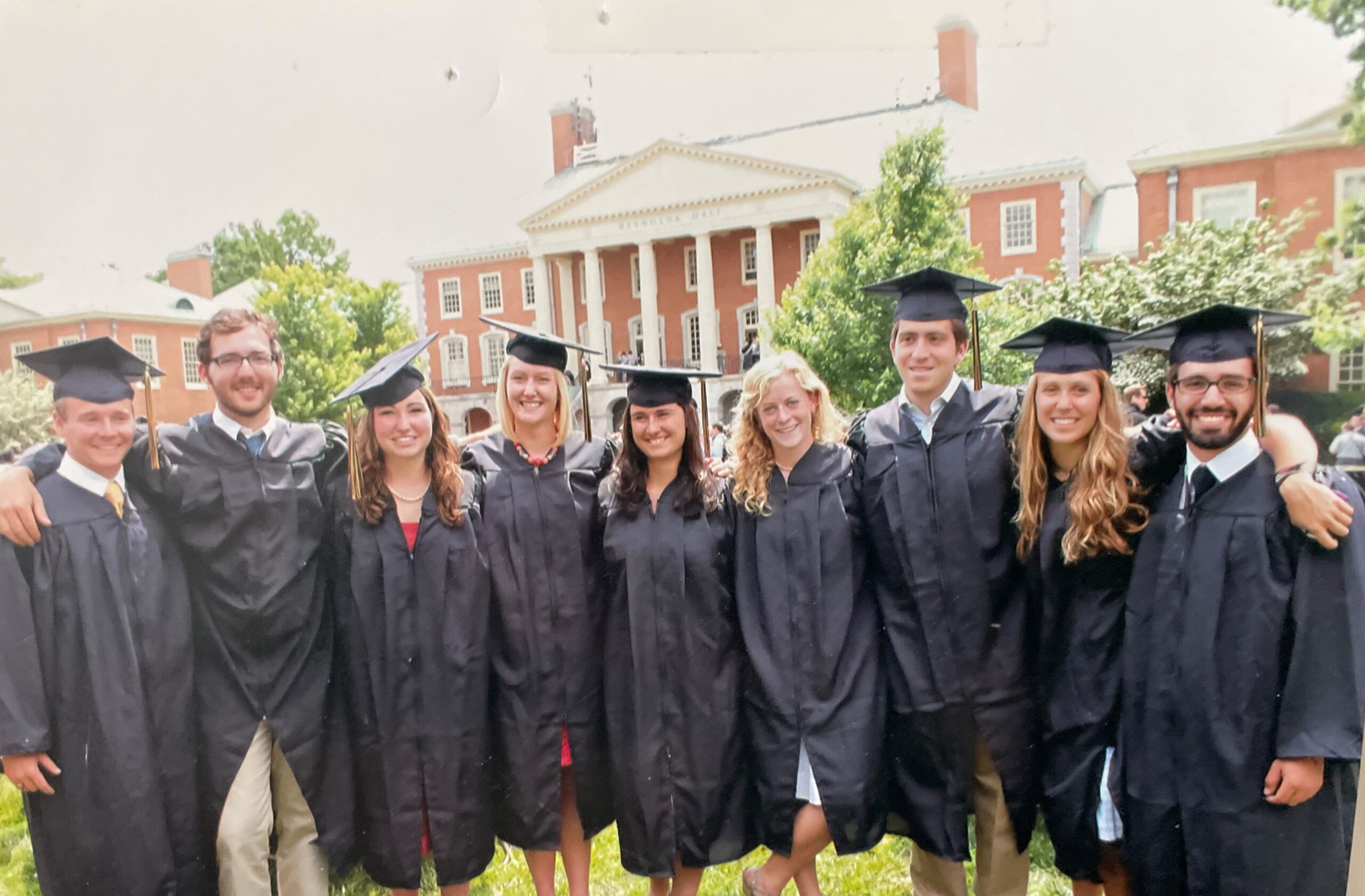
Participants from the Class of 2011 included John Malloy (second from left), Lauren Dayon (third from left), Hope Nardini Malloy (fifth from left) and Claire O'Brien (sixth from left). Photo courtesy of O'Brien
KG: What was your journey from graduation to Brooks Pierce in 2020?
CO: I graduated from Wake and wanted to work in (Washington,) D.C. in politics and policy. I had a wonderful time in D.C. Then I came back to North Carolina to go to (the University of North Carolina at Chapel Hill) for law school, but always with the intent of going back to Washington, because that’s where my now-husband was living, and because I love D.C. So, after graduating from UNC, I went back and worked for Covington & Burling LLP. I was in their food and drug practice and really enjoyed it. I clerked for Judge (Liam) O’Grady in (U.S. District Court for) the Eastern District of Virginia, and loved it, loved it, loved it. But then we decided we wanted to come back to North Carolina to have a family. So, I was looking for a place where I could continue to do regulatory work, and I found a spot at Brooks Pierce doing health care work. I’ve liked it a lot. It’s been a really good place for us.
KG: Are there issues locally that you’re involved in?
CO: I’m on the board of Partners Ending Homelessness, which is working to end homelessness in Guilford County generally, and to help those who are experiencing it at the time. They work on something called coordinated entry, which is helping to connect people who are experiencing homelessness with housing opportunities. That’s something I’ve been interested in since I lived in D.C., where I did a lot of landlord tenant pro bono work.
I’m also on the board of Greensboro Beautiful. It’s a nonprofit organization that works with the city of Greensboro to beautify the city. Our big annual event is called NeighborWoods. Neighborhoods can apply, and we come and plant trees. It’s areas that don’t have any trees, but it’s also areas that have trees that are getting older and may die soon. Just a couple of weeks ago, we were at Bennett College, a really small college in downtown Greensboro that’s celebrating its 150th anniversary. Someone had found their original landscape plans, and many of those trees were gone. So, we planted 195 trees to rejuvenate the campus and restore it to its original glory.
KG: Thank you so much for sharing your story, and especially for the work you and your sisters are doing to help women in Afghanistan. I’m looking forward to seeing what you do next — and I am sure many alumni would like to participate in next year’s run!


